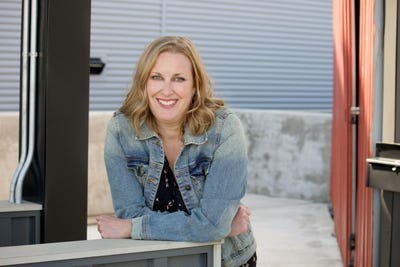Hiring people with special needs? Here are 7 things to know
It’s a worthwhile endeavor for your organization and your community, but in case you’re apprehensive about hiring people with physical and mental challenges, here are some pointers from two experienced general managers.
Sure, it’s a good thing to do…hiring special-needs workers helps those individuals build pride, learn skills and get more independent. But their presence in the workplace can become a true asset to their employers as well.
“There’s no doubt that this kind of experience is transformative for special-needs workers,” says Maureen Metz, executive vice president of merchandising at Metz Culinary Management, which has a welcoming policy for this segment of the workforce. “But what’s also emerging is a benefit to their colleagues and the customers they interact with daily. It’s a raising of awareness; it’s a heightening of sensitivity and it’s a chance to break down stereotypes.”
 Metz's Zibair Shahid (center) with special-needs workers Kermit and Kamesha.
Metz's Zibair Shahid (center) with special-needs workers Kermit and Kamesha.
To get some advice for those wanting to hire special-needs people, FM spoke with two general managers currently doing so with Metz Culinary Management, Zibair Shahid at Florida A&M University in Tallahassee and James Dulin at Maryville College in Maryville, Tenn. Here are their best insights.
• Get started with an agency: Agencies such as Project Search connect high school age people with special needs to employers across the country. Dulin not only works with Project Search to place students in jobs and internships at Maryville College’s foodservice operation, but he also serves on the organization’s business advisory council. “The whole purpose is by the end of the program, we’ve worked with them and gotten them a job somewhere,” he says.
Agencies like Project Search often provide a facilitator or “job coach” that can accompany the individual to the job—being as hands-on as needed. “We have someone on the autism spectrum serving on our hot line,” Dulin says. “The coach is there, observing, not right beside them. But in the beginning the coaches are very hands-on, ‘This is how you do the job.’”
• Work with public schools as well: “We work with an agency and we also work with local public schools,” Shahid says. “They come in with a facilitator and we provide them with the opportunity to work in the front of the house and the dining hall so they get work experience and can become productive members of society.”
• Evaluate their skills on an individual basis: When training a special-needs employee or intern, like any new employee, try to get a sense for where they are at: what are their strengths, what might they be aspiring to? What are their physical limitations (if any?). Shahid says he evaluates on a person-by-person basis and makes sure they’ve got enough support and encouragement along the way.
• Provide encouragement: “We give them time,” Shahid says. “Coach them and give them time. We don’t expect them to learn in one or two days. I advise my management team to give them extra attention and encouragement. We want to make sure they’ll be able to cut it.” Eventually, Shahid says, he sees this strategy pay off. “When I make my rounds, I don’t see any difference when they’re performing their duties.” He makes it a point to recognize good work with awards and says, “I cannot explain to you the look on their face when their name is called.”
 Jacob was recently honored for his service; Megan builds a dish in the kitchen.
Jacob was recently honored for his service; Megan builds a dish in the kitchen.
• Don’t limit opportunities: Dish room, cleaning and housekeeping jobs are good places to start, and also to shine in the long term, but if an individual demonstrates an interest and an ability in something else, don’t be afraid to try it, Shahid and Dulin both agreed.
“I see them first as an intern through Project Search, going through all the things we’d ask them to do,” Dulin says. “So I can see: This guy’s thirsty. He wants to learn. He’s got an attitude that lines up with our core values. He wants to cook.”
• Show sensitivity: What can go wrong? Don’t think there won’t be any obstacles. In such a people-oriented business as foodservice, interactions happen all the time, and they’re not always great. “Basically, college students are college students,” Dulin says. “And some are comfortable around people with special needs and some are uncomfortable. And it’s a new group every year.”
In troubling situations, some of the younger employees with special needs especially, “they’ll get a little anxious,” Dulin says. “And the coach will sit down and talk to them and just take a little break.”
But the good news is, by the end of the year, “the kids are used to seeing them and they’re having a good time together…we try to educate our folks. People are sometimes a little tentative about hiring or working with people with special needs, but I’ve become more comfortable, my management staff is very comfortable,” Dulin says.
 Kermit is on the job for Metz Culinary Management.
Kermit is on the job for Metz Culinary Management.
• Play up the positives: “My observation is that the five special-needs employees here, I see the dependability and I see the commitment,” Shahid says. “When we make a schedule they’re always right on time; in my opinion that’s their strength. They can remain focused, and I appreciate them and I encourage them.”
“The traits that I’m looking for in an employee, for hospitality, you can’t say that they [employees with special needs] don’t possess that,” Dulin says. “This has taught my employees that this is how we deal with people. The attitude and the culture here is very accepting.”
About the Author
You May Also Like






